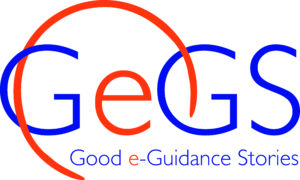 In recent years, Rinova has been working with an international consortium of partners through the European Union’s Lifelong Learning and Erasmus+ programmes to develop the ‘Guide – Good Guidance Stories’ case study-based methodology for Information, Advice and Guidance (IAG) practitioners. In 2021, this work saw a substantial uplift with the approval of the Good e-Guidance Stories (GeGS) project, from the European Commission’s ‘Support for Policy Reform’ strand of the Erasmus+ KA3 programme.
In recent years, Rinova has been working with an international consortium of partners through the European Union’s Lifelong Learning and Erasmus+ programmes to develop the ‘Guide – Good Guidance Stories’ case study-based methodology for Information, Advice and Guidance (IAG) practitioners. In 2021, this work saw a substantial uplift with the approval of the Good e-Guidance Stories (GeGS) project, from the European Commission’s ‘Support for Policy Reform’ strand of the Erasmus+ KA3 programme.
Responding to the Commission’s call for experimentation projects that will support the modernisation of IAG and Vocational Education and Training (VET) sectors across Europe, GeGS’s innovative approach centres around two critical elements: providing IAG practitioners with a complete, engaging and easy to use digital training framework, and introducing advanced tools for e-guidance, based on artificial intelligence. Its specific objectives are to (a) Enhance the culture shift in IAG for VET modernisation by co-creation of a comprehensive training measure for IAG practitioners leading to effective e-services and (b) plan, test and the adaptation and introduction of an AI based, digital IAG technology as a key driver towards IAG and VET reform.
GEGS combines peer-led practice ‘bottom-up’ approaches and top-down strategies, designed to improve the relevance of IAG systems to young people needs, labour market changes and digitalisation processes. It involves VET Managers and directors, Public Authorities across the EU. Direct beneficiaries are young people (15-29) at transition points, NEETs and job-seekers. The ‘Good Guidance’ Case Studies are being combined with engaging quality methods to progress IAG practitioner competences through an active Community of Practice and Action Learning Sets.
Rinova, which coordinated the predecessor ‘Guide 2.0’ project, is joined in the consortium by a network of partners from Germany, Italy, France, Ireland and Greece, many of whom are also members of Metropolisnet, which is acting as project coordinator. Part of Rinova’s key role in the project is to lead the preparatory work in GeGS that is focused on the co-creation of an innovative digital case study-based learning environment addressing IAG practitioner competences (CEDEFOP 2009) and digital competences for IAG. All this experience will be combined with technical partner Jobiri’s e-guidance platform, as an AI-based digital career advisor.
GeGS follows the hypothesis that an IAG digitalisation process is not only about new technology but needs to be underpinned by systemic change and participatory training opportunities on digital and IAG competences to ensure that effective IAG e-services will be designed client- centred, holistic and empowering. Therefore a central aspect of GeGS will be to contrast, through an extensive field trial and evaluation, the robustness of this hypothesis in three European regions – Berlin (Germany), Sardinia (Italy) and Thessaly (Greece), which are backed by involvement from high-level public authorities in VET – with three trials – in the UK, Ireland and France – which do not have this involvement.
If you are an IAG practitioner, or you are involved in the management of guidance services and would like get involved, we are extending our practice network in this area for practitioners in London and the UK to find out more about the Guide approach to guidance. To find out more, contact Richard Parkes at r.parkes@rinova.co.uk
 The European Commission support for the production of this publication does not constitute an endorsement of the contents which reflect the views only of the authors, and the Commission cannot be held responsible for any use which may be made of the information contained therein.
The European Commission support for the production of this publication does not constitute an endorsement of the contents which reflect the views only of the authors, and the Commission cannot be held responsible for any use which may be made of the information contained therein.


